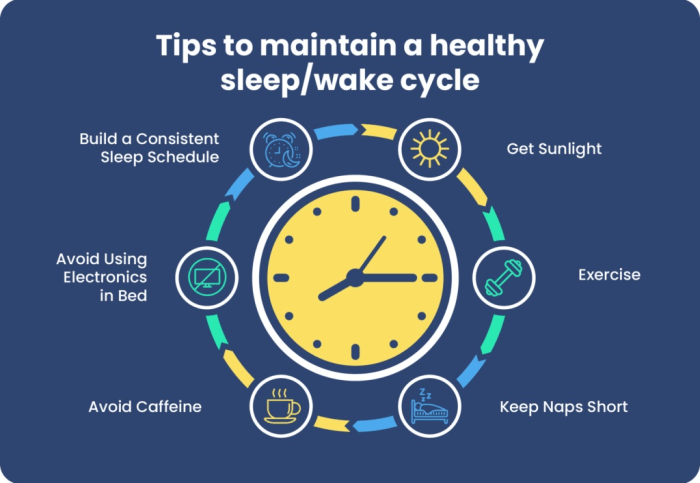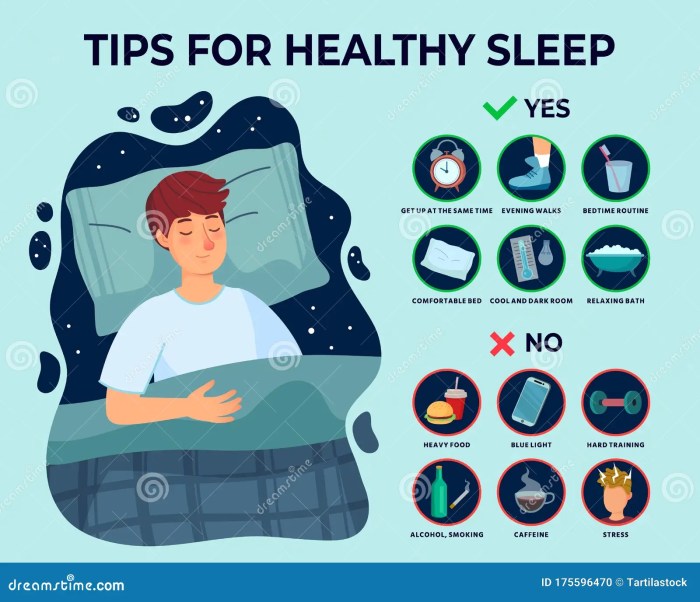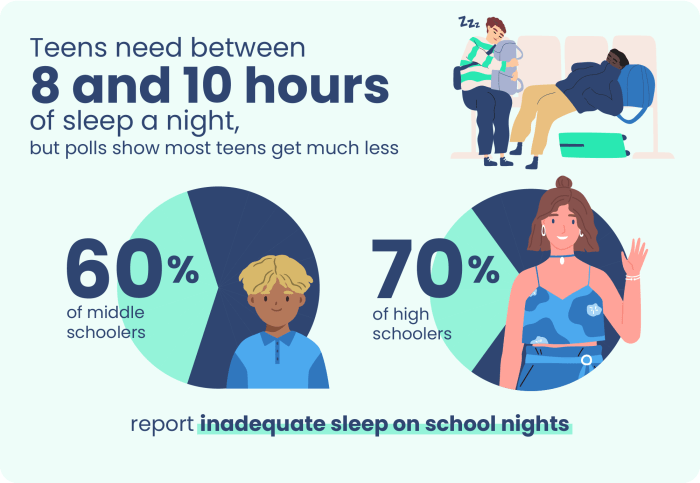How to Get 7 Hours of Sleep Every Night dives into the importance of a good night’s rest, offering practical tips and insights to help you achieve this goal effortlessly. From the significance of sleep to creating a sleep routine, this guide covers it all.
Discover the secrets to improving your sleep quality and overall well-being with simple yet effective strategies Artikeld in the following sections.
Importance of Sleep

Getting 7 hours of sleep each night is crucial for overall health. Sleep plays a vital role in various bodily functions, including cognitive function, emotional well-being, and physical health. Consistently getting enough sleep has numerous benefits that contribute to overall well-being.
Benefits of Consistently Getting Enough Sleep
- Improved cognitive function: Adequate sleep is essential for optimal brain function, memory consolidation, and overall cognitive performance.
- Enhanced mood and emotional well-being: Getting enough sleep can help regulate emotions and reduce the risk of mood disorders.
- Boosted immune system: Sleep is vital for a healthy immune system, helping the body fight off infections and illnesses.
- Increased productivity and focus: Proper rest can improve concentration, productivity, and decision-making abilities.
- Physical health benefits: Consistent sleep can lower the risk of chronic conditions such as heart disease, diabetes, and obesity.
Impact of Lack of Sleep on Daily Life and Productivity
- Impaired cognitive function: Sleep deprivation can lead to poor concentration, memory problems, and difficulty making decisions.
- Mood disturbances: Insufficient sleep is linked to irritability, mood swings, and increased stress levels.
- Increased risk of accidents: Fatigue from lack of sleep can impair coordination and reaction time, leading to accidents at work or while driving.
- Weakened immune system: Chronic sleep deprivation can weaken the immune system, making individuals more susceptible to illnesses.
- Reduced productivity: Lack of sleep can hinder productivity, creativity, and overall performance in daily tasks.
Creating a Sleep Routine

Establishing a consistent bedtime routine is crucial for improving the quality and duration of your sleep. By following a set schedule every night, your body will learn to anticipate sleep, making it easier to fall asleep and wake up feeling refreshed.
Importance of Winding Down Before Sleep
One important aspect of creating a sleep routine is winding down before bedtime. This involves engaging in relaxing activities that signal to your body it’s time to sleep. Some tips for winding down include:
- Avoiding screens such as smartphones, tablets, and computers at least an hour before bed. The blue light emitted by these devices can disrupt the production of melatonin, a hormone that regulates sleep.
- Engaging in calming activities like reading a book, taking a warm bath, or practicing deep breathing exercises.
- Avoiding stimulating activities like intense exercise or watching thrilling movies close to bedtime.
Strategies for Creating a Sleep-Conducive Environment
In addition to winding down before sleep, creating a sleep-conducive environment can greatly impact the quality of your sleep. Consider the following strategies:
- Keep your bedroom cool, dark, and quiet to promote a restful sleep environment.
- Invest in a comfortable mattress and pillows that provide adequate support for your body.
- Avoid consuming caffeine or heavy meals close to bedtime, as they can interfere with your ability to fall asleep.
- Establish a relaxing bedtime routine that you can follow every night to signal to your body that it’s time to sleep.
Healthy Sleep Habits: How To Get 7 Hours Of Sleep Every Night

Maintaining healthy sleep habits goes beyond just the number of hours you spend in bed. Your diet, exercise routine, and screen time can all play a significant role in the quality of your sleep.
The Role of Diet and Exercise
Eating a well-balanced diet and staying physically active can help promote better sleep. Avoid heavy meals close to bedtime as they can disrupt your sleep. Incorporating regular exercise into your routine can also help regulate your sleep patterns.
Avoiding Stimulants Before Bedtime, How to Get 7 Hours of Sleep Every Night
Limit your intake of stimulants like caffeine and nicotine in the hours leading up to bedtime. These substances can interfere with your ability to fall asleep and stay asleep. Opt for decaffeinated beverages and avoid smoking close to bedtime.
Minimizing Screen Time
The blue light emitted by screens can interfere with the production of melatonin, a hormone that regulates sleep. Try to limit screen time at least an hour before bed. Engage in relaxing activities like reading or listening to calming music instead to prepare your body for sleep.
Managing Stress for Better Sleep

Stress can significantly impact the quality of our sleep. When we are stressed, our minds are racing, making it difficult to relax and fall asleep. This can lead to insomnia, restless sleep, and overall poor sleep quality. Therefore, managing stress is crucial for ensuring a good night’s rest.
Relaxation Techniques to Reduce Stress
Before bedtime, it’s essential to unwind and calm your mind to prepare for sleep. Here are some relaxation techniques that can help reduce stress:
- Deep Breathing: Practice deep breathing exercises to slow down your heart rate and relax your body.
- Progressive Muscle Relaxation: Tense and then release each muscle group in your body to alleviate tension.
- Meditation: Engage in mindfulness meditation to clear your mind and promote relaxation.
- Guided Imagery: Visualize calming and peaceful scenes to help ease stress and anxiety.
Improving Sleep Through Stress Management Strategies
Implementing stress management strategies throughout your day can also contribute to better sleep at night. Here are some tips to help manage stress and improve your sleep:
- Regular Exercise: Physical activity can help reduce stress and promote better sleep. Aim for at least 30 minutes of exercise most days of the week.
- Healthy Diet: Eating a balanced diet can support your overall well-being and reduce stress levels. Avoid caffeine and heavy meals close to bedtime.
- Establish a Bedtime Routine: Create a relaxing bedtime routine to signal to your body that it’s time to wind down and prepare for sleep.
- Avoid Screens Before Bed: The blue light emitted by screens can interfere with your body’s natural sleep-wake cycle. Avoid screens at least an hour before bedtime.
Conclusive Thoughts

In conclusion, mastering the art of getting 7 hours of sleep every night is not only beneficial for your health but also for your productivity and overall quality of life. By implementing the tips and techniques discussed, you can transform your sleep patterns and wake up feeling refreshed and rejuvenated each day. Sweet dreams await!